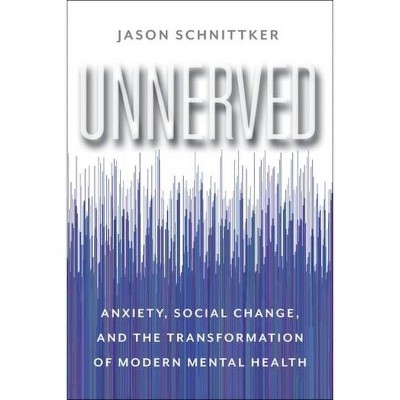Unnerved - by Jason Schnittker (Hardcover)

Similar Products
Products of same category from the store
AllProduct info
<p/><br></br><p><b> About the Book </b></p></br></br>Jason Schnittker investigates the social, cultural, medical, and scientific underpinnings of the modern mental state. He explores how anxiety has been understood from the late nineteenth century to the present day and why it has assumed a more central position in how we think about mental health.<p/><br></br><p><b> Book Synopsis </b></p></br></br>Anxiety is not new. Yet now more than ever, anxiety seems to define our times. Anxiety disorders are the most common psychiatric disorders in the United States, exceeding mood, impulse-control, and substance-use disorders, and they are especially common among younger cohorts. More and more Americans are taking antianxiety medications. According to polling data, anxiety is experienced more frequently than other negative emotions. Why have we become so anxious? <p/>In <i>Unnerved</i>, Jason Schnittker investigates the social, cultural, medical, and scientific underpinnings of the modern state of mind. He explores how anxiety has been understood from the late nineteenth century to the present day and why it has assumed a more central position in how we think about mental health. Contrary to the claims that anxiety reflects large-scale traumas, abrupt social transitions, or technological revolutions, Schnittker argues that the ascent of anxiety has been driven by slow transformations in people, institutions, and social environments. Changes in family formation, religion, inequality, and social relationships have all primed people to be more anxious. At the same time, the scientific and medical understanding of anxiety has evolved, pushing it further to the fore. The rise in anxiety cannot be explained separately from changes in how patients, physicians, and scientists understand the disorder. Ultimately, Schnittker demonstrates that anxiety has carried the imprint of social change more acutely than have other emotions or disorders, including depression. When societies change, anxiety follows.<p/><br></br><p><b> Review Quotes </b></p></br></br><br><i>Unnerved </i>is a beautifully executed social epidemiology of anxiety in the United States. Schnittker takes as a starting point the large cohort differences in anxiety, which he analyzes with acute sociological insight. In doing so, he not only teaches us about the social sources of anxiety but also reveals much about our changing society.--Bruce Link, coeditor of <i>The Oxford Handbook of Stigma, Discrimination, and Health</i><br><br>Few sociologists have examined the phenomenon of anxiety. In <i>Unnerved</i>, Schnittker provides the most detailed sociological examination of anxiety, the most extensive discussion of the differences between anxiety and depression, and the most comprehensive empirical study of how social factors are related to anxiety that has yet been written.--Allan Horwitz, author of <i>Anxiety: A Short History</i><br><br>With clear prose, empirical rigor, and a keen sociological eye, Schnittker has written a masterful synthesis of the research on anxiety. <i>Unnerved</i> reveals that, yes, we are truly living in an age of anxiety. Anyone interested in anxiety, its history, and its social determinants would be wise to start with this book.--Owen Whooley, author of <i>On the Heels of Ignorance: Psychiatry and the Politics of Not Knowing</i><br><p/><br></br><p><b> About the Author </b></p></br></br>Jason Schnittker is a professor of sociology at the University of Pennsylvania. He is the author of <i>The Diagnostic System: Why the Classification of Psychiatric Disorders Is Necessary, Difficult, and Never Settled</i> (Columbia, 2017).
Price History
Price Archive shows prices from various stores, lets you see history and find the cheapest. There is no actual sale on the website. For all support, inquiry and suggestion messagescommunication@pricearchive.us



















